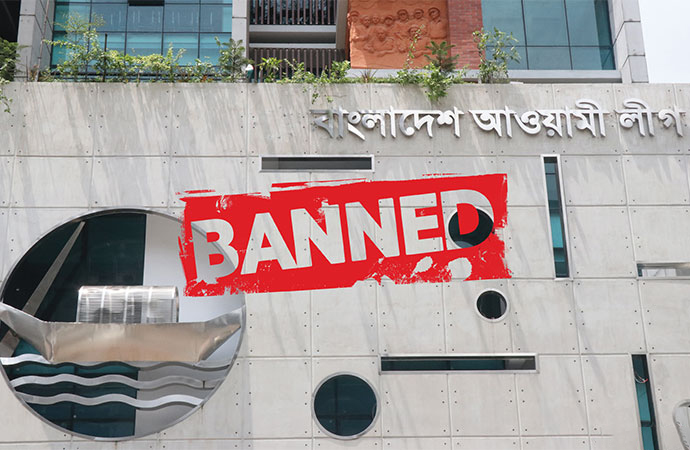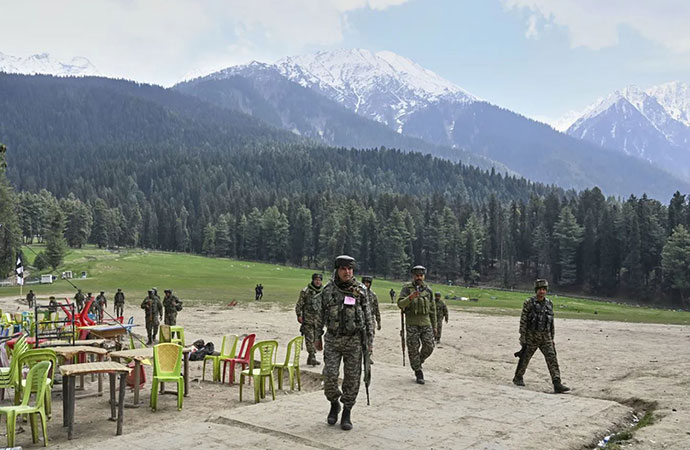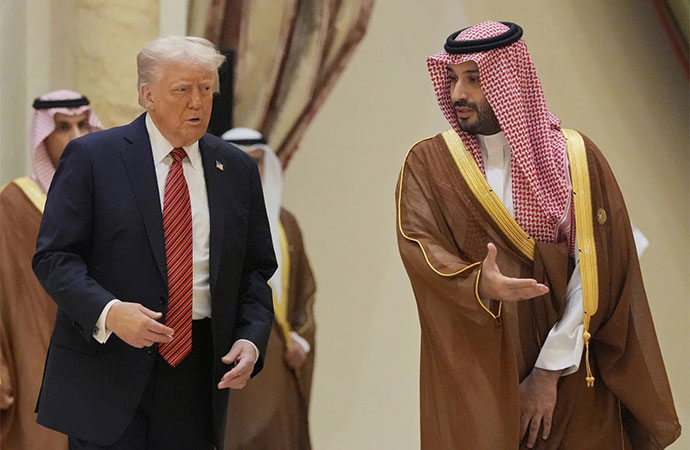Reportage

Image: wikimedia.org
The interim government's decision to ban the activities of the Awami League is a sign of both its weaknesses and its strengths. The Advisory Council of the interim government, on May 10, decided that all activities of the Awami League-including in cyberspace-will be banned under the Anti-Terrorism Act until the trial of the ousted party and its leaders is completed at the International Crimes Tribunal.
It was a historic decision, no matter how you look at it. According to a statement, the decision to effectively ban Awami League, albeit temporarily, was taken in order to protect the country's security and sovereignty, ensure the safety of the July Movement's leaders and activists, and safeguard plaintiffs and witnesses of the International Crimes Tribunal, where mostly AL leaders and police and other security officials it promoted during its years of misrule are being tried for crimes against humanity.
The statement further said that the Advisory Council decided to finalise and publish the July Declaration within the next 30 working days. Earlier, protesters demanding a ban on the Awami League warned they would launch a "March to Jamuna (the official residence of the chief adviser)" unless the interim government announces a clear roadmap for outlawing the party.
Things came to a head on Saturday (May 10), as they blockaded the road between Banglamotor and Shahbagh, centering their blockade at Razoshiq Mor in front of the Hotel Intercontinental.
Hasnat Abdullah, chief organizer (south) of the National Citizen Party and one of the key leaders of the student-led uprising that toppled the AL regime, announced the plan from Shahbagh at around 7:30pm on Saturday.
"We will announce a 'March to Jamuna' if we do not receive a clear roadmap for banning the Awami League within the next hour," he had said.
"For now, we will not proceed to Jamuna. We will move in that direction only if it becomes necessary," Hasnat noted.
Saturday's mass gathering at Shahbagh in Dhaka focused on three demands: banning the Awami League, issuing the July Declaration, and enacting legal provisions for trying the party at the International Criminal Tribunal.
The rally, which began shortly after 3pm at the Shahbagh intersection, was joined by leaders and activists from various parties, including the two major blocs that have led protests demanding the Awami League's ban.
The first includes post-July uprising groups: the National Citizen Party, United Peoples' Bangladesh (an emerging pressure group), the Bangladesh Democratic Student Council, and the "July Unity" coalition of more than 50 organizations, such as Inqilab Manch, the Anti-Fascist Coalition, and July Manch.
The second comprises Islamist organizations, including Jamaat-e-Islami, Bangladesh Islami Chhatra Shibir, Islamic Movement Bangladesh, the Islamic Student Movement Bangladesh, and Hefazat-e-Islam Bangladesh.
The immediate catalyst for the protests was former President Abdul Hamid's departure to Bangkok on Thursday morning, months after the fall of Sheikh Hasina's Awami League government during the student-led uprising of August 2023. Unlike many AL leaders who fled immediately after the uprising, Hamid had remained in the country until now; protesters accuse the interim government of facilitating his escape.
Nuts and bolts of the ban
On May 12, the interim government issued a gazette notification imposing a ban on all sorts of political activities of the Bangladesh Awami League and its associate bodies until the completion of the trial of the party's leaders and activists at the International Crimes Tribunal on allegations of crime against humanity.
The Public Security Division under the home ministry issued the gazette notification. Before that, on Sunday, the interim government issued the Anti-terrorism Act (amended) Ordinance including a new provision for imposing ban on persons or any entity (organisation) involved in violence and terrorism.
As per the previous version of the act, to meet the purpose of the act, the government may, on the basis of reasonable grounds that any person or entity is involved in terrorist acts, list such a person in the Schedule or declare the entity prohibited and list it in the Schedule by issuing official gazette notifications.
However, there was no provision in the law regarding the prohibition of the activities of any entity. The new amendment allows the government to impose a ban on activities of any entity.
According to the Anti-Terrorism Act, the term 'entity' refers to legal entities, statutory agencies, commercial or non-commercial organisations, group, partnership business, cooperative associations and any organisation comprising one or more persons.
On Saturday, three decisions were taken in the advisory council meeting presided over by chief adviser Muhammad Yunus. As per those decisions, the International Crimes Tribunal (ICT) Act has been amended.
According to that amendment, the International Crimes Tribunal can punish any party or its associate bodies. Apart from that, decisions were taken to protect the country's sovereignty until Awami League leaders' trials at the ICT are complete, ensuring security of July protesters and imposing ban on Awami League's activities, including its activities on cyber space, to ensure safety of the plaintiffs and eyewitnesses in the cases filed with the ICT.
The interim government also initiated the steps to block the websites and social media platforms of the Bangladesh Awami League and all its affiliated, associate, and fraternal organisations.
The National Cyber Security Agency issued a letter to the Bangladesh Telecommunication Regulatory Commission (BTRC) to take action in this regard on Tuesday (May 13), said Faiz Ahmed Taiyab, special assistant to the chief adviser on posts, telecommunication and information technology.
The move followed the gazette notification issued on Monday banning all activities of the Awami League and its affiliated bodies until the trial of their leaders and activists at the International Crimes Tribunal is completed.
The notification, issued by the Public Security Division of the Ministry of Home Affairs, restricted all forms of activities, including publications, campaigns, rallies, meetings, and conferences, by these organisations across media, online platforms, and social media.
The action was taken under the authority of the Anti-Terrorism (Amendment) Ordinance.
On the same day, the election commission suspended the registration of the Awami League as a political party.
Will it work?
Among the ban's critics, much is being made of the United Nations High Commissioner for Human Rights, Volker Turk's recommendation. Un its Fact-Finding Report on the July Revolution, his office advised the interim government to refrain from banning political parties and disenfranchising large parts of the electorate. In its recommendations on the stifling of civic space and reforming a repressive legal framework, the Fact-Finding Mission urged the interim government to "refrain from political party bans undermining democracy and disenfranchising part of the electorate" and to "protect journalists, political party activists, minority leaders and rights defenders".
The Fact-Finding Report also called for "a safe and enabling environment for free and genuine elections, including by special pre-election measures to ensure a level playing field for all political parties and candidates". Bans on the largest political parties would spoil the environment for a free and fair election. One of these parties is the Awami League, which has secured at least 30% of the national vote share in successive general elections.
That being said, the ban's supporters point out that Turk's recommendation doesn't really hold much water here, since his remit did not extend beyond the occurrences during the July Revolution. He (i.e. Turk) did not take into consideration the fact that AL effectively stole 3 elections on the trot. He did not consider how they turned the country into a mafia state, where banks were being taken over at gunpoint, and these guns were being provided by the state (among other things). He did not take into account Aynaghor and all the extrajudicial killings of political opponents over the years, the very real suppression of freedom of speech and thought, and he did not account for AL's unbridled corruption, or all the financial scams that ran amok.
Nevertheless, banning a political party is always problematic, especially one founded on an ideology, and there is no doubt the Awami League does represent certain progressive values, notably secularism, within the Bangladeshi electorate. The interim government has thus decided to temporarily ban the Awami League under the Anti-Terrorism Act until the completion of trials at the International Crimes Tribunal, where AL leaders are being prosecuted for atrocities committed during the July Revolution. An amendment to the International Crimes Tribunal Act was also announced to allow for the trial of political groups at the tribunal, which would indicate plans to prosecute the Awami League as a political entity. According to Law Adviser Asif Nazrul, the ban aims to "ensure national security, protect leaders and activists of the uprising, and safeguard plaintiffs and witnesses involved in the tribunal proceedings". Is the ban a stopgap measure for law and order or a sustained campaign to exclude the Awami League from the future political process? Will the Awami League be permanently banned as a result of a finding from the tribunal which holds the political group guilty for the atrocities of the July Revolution?
Reform has been the buzzword of the post-July Revolution status quo under the interim government. Reform entails the enabling and broadening of democratic participation in our political parties by opening the doors to internal democracy and a new generation of political leadership. When the interim government assumed office in August 2024, its first appointee in the home ministry, Brigadier General (retd.) Sakhawat Hossain, called for a Political Parties Act. The brigadier was then swiftly removed as part of a cabinet reshuffle.
Ten months later, the interim government has proceeded to ban the Awami League instead of pushing for genuine reforms within political parties. Much of the discourse on reforms has focused on constitutional and legal reforms for the state. It has become a taboo to discuss internal reforms within political parties, be it the Awami League or the Bangladesh Nationalist Party (BNP). The BNP and Jamaat stand to gain most from the decision to ban the Awami League. The proliferation of pro-BNP and pro-Jamaat individuals into the echelons of the interim government, from the lower levels of the bureaucracy to political appointees at higher echelons, including the Attorney General's office and Bangladesh's Ambassador to Mexico, has raised eyebrows among many. BNP and Jamaat have been considered as the "government-in-waiting". They are pulling strings behind the scenes and influencing key decisions.
Bangladesh needs leadership which rises above the desire to seek revenge. It was the cardinal mistake of Sheikh Hasina to seek vengeance after coming to power in 2009 which eventually led to her ignominious downfall in 2024. While Bangladesh is fortunate to have a Nobel Peace Prize laureate as its interim leader today, is Muhammad Yunus being able to rise above the hatred and animosity which pervades the political scene? His advisers have made it clear that they are not a neutral government. One adviser has described the interim administration as "highly politically-motivated". Reports of mass arrests of Awami League leaders and activists complicate the situation further by creating an atmosphere of fear and reprisal for the opposition.
The revolution of 2024 was meant to usher in a qualitative change in politics. The interim government has the power and capacity to push through reforms which would enable political parties to practice internal democracy. The question is whether the interim government will capitalize on its power and capacity to do so. An ordinance can be promulgated to require political parties to internalise and institutionalise many of the reforms which are being demanded for the state, including term limits and free and fair elections.
The Awami League must introspect and atone for its own authoritarian leanings. Despite its history as the vanguard party of the 1971 Liberation War and adopting a constitution in 1972 which espoused liberal and multiparty democracy, the League was responsible for the destruction of parliamentary democracy through the Fourth Amendment and the creation of BAKSAL as a socialist one party state in 1975. Sheikh Hasina's authoritarian control of the parliamentary system between 2009 and 2024 was a legacy of the BAKSAL misadventure. Both Sheikh Hasina and her father converted from pro-democracy icons into autocrats.
The Awami League has shown no remorse for its mistakes. Instead, the League's social media accounts have become a cesspool which targets the Yunus-led interim government as "fascist", "illegal" and "unconstitutional". At the root of Bangladesh's crisis of democracy is the League's unwillingness to co-exist with other political groups, including BNP, Jatiya Party and Jamaat. The League considers every non-AL government as illegal and illegitimate, thereby perpetuating the crisis of mutual co-existence, or rather the lack of it, which continues to plague Bangladesh's democratic functioning. That ultimately is what sealed the AL's fate.

























Leave a Comment
Recent Posts
Right On Schedule
The most eagerly anticipated, and frankly hyped up, announcement of an ...
Fighting raged along the borde ...
Fighting raged along the border of Cambodia and Thailand, with explosi ...
ICIMOD drives regional cooperation to inspire new mo ..
The Cage of Captivity and the Cry for Freedom: A Cru ..
Why Japan issued an advisory for a possible megaquak ..
The Autocrats’ War on Universities